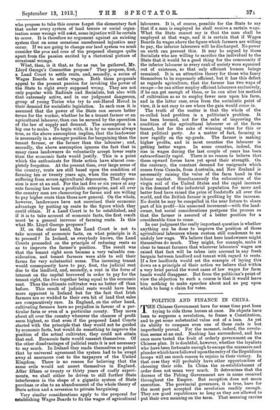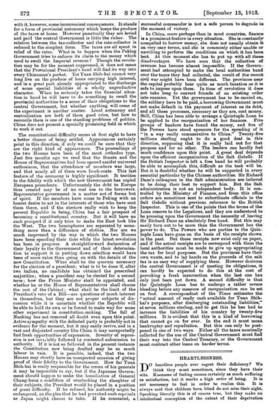POLITICS AND FINANCE IN CHINA. r E Chinese Government have for
some time past been trying to ride three horses at once. Its objects have been to suppress a revolution, to frame a Constitution, and to get some substantial value out of a loan. As yet its ability to compass even one of these ends is but imperfectly proved. For the moment, indeed, the revolu- tion seems at an end. Nanking has surrendered, and has once more tasted the fruit of orderly government on the Chinese plan. It is doubtful, however, whether the loyalists who have been fortunate enough to escape the massacre and plunder which have followed upon the entry of the Republican troops will see much reason to rejoice in their victory. In that case they will probably have other opportunities of choosing their side. In China the re-establishment of order does not mean very much. It determines that the decrees of the Peking Government are in name received throughout the Empire. But reception does not mean execution. The provincial governors, it is true, have for the most part accepted the revolution readily enough. They are good republicans so long as they are allowed to put their own meaning on the term. That meaning carries
with it, however, some inconvenient consequences. It stands for a form of provincial autonomy which keens the produce of the taxes at home. However punctually they are levied and paid the central Government is little the richer. The relation between the tax-collector and the rate-collector is reduced to the simplest form. The taxes are all spent in relief of the rates. What is to happen when the Peking Government tries to enforce its claim to the money which used to swell the Imperial revenue ? Though the revolu- tion may be for the moment suppressed, it does not mean that the PrOvi.sional President's hand will find its way into every Chinaman's pocket. Yet Yuan Shih-kai cannot very long live on the produce of loans carrying high interest, and in a great part already appropriated to the discharge of some special liabilities of a. wholly unproductive character. When he seriously takes the financial situa- tion in hand he will have to do something to recall the provincial authorities to a sense of their obligations to the central Government, but whether anything will come of the experiment is another matter. Local autonomy and centralization are both of them good cries, but how to reconcile them is one of the standing problems of politics. China does not present a specially promising field in which to work it out.
The constitutional difficulty seems at first sight to have a better chance of being settled. Appearances certainly point in this direction, if only we could be sure that they are the right kind of appearances. The proceedings of the two Houses have been of the most orthodox type. Just five months ago we read that the Senate and the House of Representatives had been opened amidst universal enthusiasm, that the attendance of members was large, and that nearly all of them wore frock-coats. This last feature of the ceremony is highly significant. It testifies to the fidelity with which the new Government has copied European precedents. Unfortunately the debt to Europe thus created may be of no real use to the borrowers. Representative government is a matter not of forms but of spirit. If the members have come to Peking with an honest desire to act in the interests of those who have sent them there, and if the electors really wish to keep the present Republic in being, China has a fair prospect of becoming a constitutional country. But it will have no such prospect if it only tries to make the East look like the West. The two hemispheres are separated by some- thing more than a difference of clothes. Nor are we much impressed by the way in which the two Houses have been spending their time while the latest revolution has been in progress. A straightforward declaration of their loyalty to the Government and of their determina- tion to support it in putting down rebellion would have been of more value than going on with the details of the new Constitution. What shall be the quorum necessary for the election of a president; what is to be done if, after two ballots, no candidate has obtained the prescribed majorities ; when a president may be elected for a second term ; how the Prime Minister shall he appointed, and whether he or the House of Representatives shall choose the rest of the Cabinet; what shall be the limit of the President's veto of a Bill—are questions of much interest in themselves, but they are not proper subjects of dis- cussion while it is uncertain whether the Republic will be able to hold its own or be forced to make way for some other experiment in constitution-making. The fall of Nanking has not removed all doubt even upon this point. Active sympathy with the defeated party is probably not in evidence for the moment, but it may easily revive, and in a vast and disjointed country like China it may unexpectedly find fresh opportunities of expression. Severity of repres- sion is not invaLia.bly followed by contented submission to authority. If it is not so followed in the present instance the Constitution now being drafted may be so much labour in vain. It is possible, indeed, that the two Houses may shortly have an unexpected occasion of giving proof of their fidelity to the Government. How far Yuan Shih-kai is really responsible for the errors of his generals it may be impossible to say, but if the Japanese Govern- ment should happen to make the humiliation of General Chang-hsun a condition of overlooking the slaughter of their subjects, the President would be placed in a position of e difficulty. If he refused, his authority might be endangered, on the plea that he had provoked such reprisals as Japan might choose to take. If he consented, a successful commander is not a. safe person to degrade in the moment of victory.
In China, more perhaps than in most countries, finance is a prominentfeature in every situation.. She is constantly,
compelled to borrow money, she does not usually obtain it
on very easy terms, and she is commonly either unable or unwilling to perform the conditions on which it has been
lent. At this moment she has to put up with all these disadvantages. We have seen that the collection of revenue has become almost impossible_ If the Govern-
ment had attempted to make the local authorities hand over the taxes they had collected, the result of the recent civil war might have been different. The provinces near the capital probably bear quite as much taxation as it is safe to impose upon them. In time of revolution it does not take long to convert friends of an existing order into enemies. Yet the government has to be carried on, the soldiery have to be paid, a borrowing Government must not make default in the payment of interest on its debt, and all these processes, necessary as they are, cost. money. Still, China has been able to arrange a Quintuple Loan to be applied to the reorganization of her finances. Five groups of bankers have found the money, and five of the Powers have stood sponsors for the spending of it "in a way really remunerative to China!' Twenty-five millions sterling ought to do a good deal in this direction, supposing that it is really laid. out for that purpose and for no other. The lenders can hardly feel much confidence upon this point. A great deal depends upon the efficient reorganization of the Salt Gabelle. If the British Inspector is left a free hand he will probably be able to accomplish this, difficult as the task will be. But it is doubtful whether he will be supported in every essential particular by the Chinese authorities. Sir Richard Dane's colleagues in the Salt administration are believed to be doing their best to support him. But the Salt administration is not an independent body. It is con- trolled by the Ministry of Finance, and from this office orders are sometimes sent to subordinate officials in the Salt Gabelle without previous reference to the British Inspector. This is one of the points that the terms of the Loan reserve to the Legations, and they are understood to be pressing upon the Government the necessity of leaving Sir Richard Dane an absolutely free band. But this may easily turn out to be more than the Government has the power to do. The Powers who are parties to the Quin- tuple Loan have gone on the basis of the receipts shown in the past. But these receipts now exist only on paper, and if the actual receipts are to correspond with them the local authorities must be made to give up appropriating the tax for local purposes. But the provinces have their own wants, and to lay hands on the proceeds of the salt tax is an easy way of supplying them. However desirous the central Government is of meeting its obligations, it can hardly be expected to do this at the cost of provoking a fresh insurrection when the last one has only just been put down. A second difficulty is that the Quintuple Loan has to undergo a rather severe bleeding before any measure of reorganization can be set on foot. A correspondent of the Times estimates the "actual amount of ready cash available for Yuan Shih- kai's purposes, after discharging outstanding liabilities," at seven millions sterling, and to get this he has had to increase the liabilities of his country by twenty-five millions. It is evident that this is a kind of borrowing that cannot go on for ever. In the end it mast mean bankruptcy and repudiation. But this can only be post- poned in one of two ways. Either all the taxes nominally collected for the use of the Central Government must find their way into the Central Treasury, or the Government must contract other loans on harder terms.











































 Previous page
Previous page